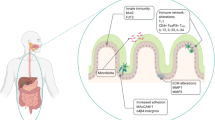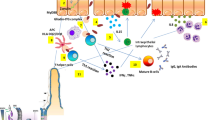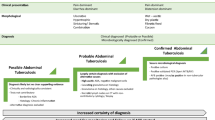Opinion statement
-
Crohn’s disease of the small intestine is a chronic relapsing disease that requires all the knowledge and ingenuity of the gastroenterologist to successfully treat the disease and the patient.
-
For mild to moderate disease, the first line of therapy is to utilize maximum doses of mesalamine to achieve a remission.
-
If the patient relapses, the maximum dose of mesalamine required to achieve remission should be continued.
-
If the disease relapses despite maximum mesalamine, antibiotics should be tried (before prescribing corticosteroids) using ciprofloxacin 500 mg b.i.d., alone or in combination with metronidazole 250 mg q.i.d. for 2 to 3 weeks. If successful, antibiotics can be slowly tapered off.
-
If antibiotics are unsuccessful, one may try elemental diet for 2 weeks before starting corticosteroids.
-
For moderate to severe Crohn’s disease, begin 40 mg of prednisone. After 2 weeks, taper slowly and start 6-MP or azathioprine, which can be used for several years.
-
If the disease recurs on 6-MP or azathioprine, or prior to 6-MP or azathioprine having a chance to be effective, give an IV infusion of Infliximab, which can be repeated at 4 to 8 weeks after the initial infusion.
-
If the patient continues to be unwell, surgery should be contemplated.
Similar content being viewed by others
References and Recommended Reading
Singleton JW, Hanauer SB, Getnick G, et al.: Mesalamine capsules for the treatment of active Crohn’s disease: Results of A 16 week trial. Gastroenterology 1993, 104:1293–1300.
Modigliani R, Colombel JF, Dupas JL, et al.: Mesalamine in Crohn’s disease with steroid-induced remission: Effect on steroid withdrawal and remission maintenances. Gastroenterology 1996, 110:688–693.
Tremaine WJ, Schroder KW, Harrison JM, Zinsmeister AR: A randomized, double blind, placebo controlled trial of the oral mesalamine (5-ASA) preparation, Asacol, in the treatment of symptomatic Crohn’s and ileocolitis. J Clin Gastroenterol 1994, 19:278–282.
Prantera C, Pallone F, Brunetti G, et al.: Oral 5-aminosalicylic acid (Asacol) in the maintenance treatment of Crohn’s disease. Gastroenterology 1992, 103:363–368.
Camma C, Guinta M, Roselli M, Cottone M: Mesalamine in the maintenance treatment of Crohn’s disease: A meta-analysis adjusted for confounding variables. Gastroenterology 1997, 113:1465–1473. A meta-analysis adjusting for various differences in trials in mesalamine demonstrating mesalamine’s effectiveness in maintenance treatment of Crohn’s disease.
McLeod R, Wolff BG, Steinhart AH, et al.: Prophylactic mesalamine treatment decreases postoperative recurrence of Crohn’s disease. Gastroenterology 1995, 109:404–413.
Greenberg GR, Feagan BG, Martin F, et al.: Oral budesonide for active Crohn’s disease. N Engl J Med 1994, 331:836–841. Excellent multicentered, randomized trial demonstrating the effectiveness of a new rapidly metabolized corticosteroid in the treatment of Crohn’s disease.
Bickston SJ, Cominelli F: Treatment of Crohn’s disease at the turn of the century. N Engl J Med 1998, 339:401–402.
Greenberg GR, Feagan BG, Martin F, et al.: Oral budesonide as maintenance treatment for Crohn’s disease: A placebo-controlled, dose ranging study. Gastroenterology 1996, 110:45–51.
Pearson DC, May GR, Fick GH, et al.: Azathioprine and 6-MP in Crohn’s disease: A meta-analysis. Ann Intern Med 1995, 122:132–142.
Pearson DC: Azathioprine for maintenance of remission of Crohn’s disease. In Cochrane Review, The Cochrane Library, Issue 3. Oxford; Update Software, 1998.
D’Haens G, Geboes K, Ponette E, et al.: Healing of severe recurrent ileitis with azathioprine therapy in patients with Crohn’s disease. Gastroenterology 1997, 112:1475–1481.
Bouhnik Y, Lemann M, Mary JY, et al.: Long term follow-up of patients with Crohn’s disease treated with azathioprine or 6-metacaptopurine. Lancet 1996, 347:215. Follow-up of a large number of patients treated with azathioprine, showing the lasting effect on remission with 6-MP or azathioprine.
Feagan BG, Rochan J, Fedorak RN, et al.: Methotrexate for the treatment of Crohn’s disease. N Engl J Med 1995, 332:292–297.
Brynskov J, Freund L, Rasmussen SN, et al.: A placebocontrolled, double blind randomized control trial of cyclosporine therapy in active chronic Crohn’s disease. N Engl J Med 1989, 321:845–850.
Hanauer SB, Smith MB: Rapid closure of Crohn’s disease fistulas with continuous intravenous cyclosporin A. Am J Gastroenterol 1993, 88:646–649.
Sandborn WJ: A critical review of cyclosporine therapy in inflammatory bowel disease. Inflamm Bowel Dis 1995, 1:48–63. Outstanding review of all aspects of the use of cyclosporine therapy in irritable bowel disease.
Brandt LJ, Bernstein LH, Boley SJ, et al.: Metronidazole therapy for perineal Crohn’s disease: A follow-up study. Gastroenterology 1982, 83:383.
Rutgeerts P, Hiele M, Geboes K, et al.: Controlled trial of metronidazole for Prevention of Crohn’s recurrence after ileal resection. Gastroenterology 1995, 108:1617–1621.
Greenbloom SL, Steinhart AH, Greenberg GR: Combination ciprofloxacin and metronidazole for active Crohn’s disease. Can J Gastroenterol 1998, 12:53. Well-done controlled trial demonstrating the effectiveness of antibiotics in treating active Crohn’s disease.
Colombel JE, Lemann M, Cassagnon M: A controlled trial comparing ciprofloxacin and mesalamine for the treatment of active Crohn’s disease. Gastroenterology 1997, 112:A951.
Prantera C, Zannoni F, Scribano ML, et al.: An antibiotic regimen for the treatment of active Crohn’s disease: A randomized, controlled clinical trial of metronidazole plus ciprofloxacin. Am J Gastroenterol 1996, 91:328–332.
Lewis JD, Fisher RL: Nutrition support in inflammatory bowel disease. Med Clin North Am 1994, 78:1443–1456.
Klein S, Kinney J, Khurshecd J, et al.: Nutrition support in clinical practice: Review of published data and recommendations for future research directions. J Parenteral Enteral Nutr 1997, 21:133.
Griffiths AM, Ohlsson A, Sherman PM, et al.: Metaanalysis of enteral nutrition as a primary treatment of active Crohn’s disease. Gastroenterology 1995, 108:1056–1067.
Behrend C, Jeppesen PB, Mortensen PB: Vitamin B12 absorption after ileorectal anastomosis for Crohn’s disease: Effect of ileal resection and time span after surgery. Eur J Gastroenterol Hepatol 1995, 7:397–400.
Fazio VW, Marchetti F, Church J, et al.: Effects of resection margins on the recurrence of Crohn’s disease in the small bowel: A randomized controlled trial. Ann Surg 1996, 224:563–573.
Targan SR, Hanauer SB, van Deventer SJH, et al.: A short term study of chimeric monoclonal antibody cA2 to tumor necrosis factor alpha for Crohn’s disease. N Engl J Med 1997, 337:1029. Outstanding multi-centered, randomized, controlled trial demonstrating for the first time the effectiveness of monoclonal biologic therapy for the treatment of active Crohn’s disease.
van Deventer SJ, Elson CO, Fedorak RN. et al.: Multiple doses of interleukin-10 in steroid refractory Crohn’s disease. Gastroenterology 1997, 113:383.
Author information
Authors and Affiliations
Rights and permissions
About this article
Cite this article
Burakoff, R. Crohn’s disease of the small intestine. Curr Treat Options Gastro 3, 59–68 (2000). https://doi.org/10.1007/s11938-000-0062-3
Issue Date:
DOI: https://doi.org/10.1007/s11938-000-0062-3




